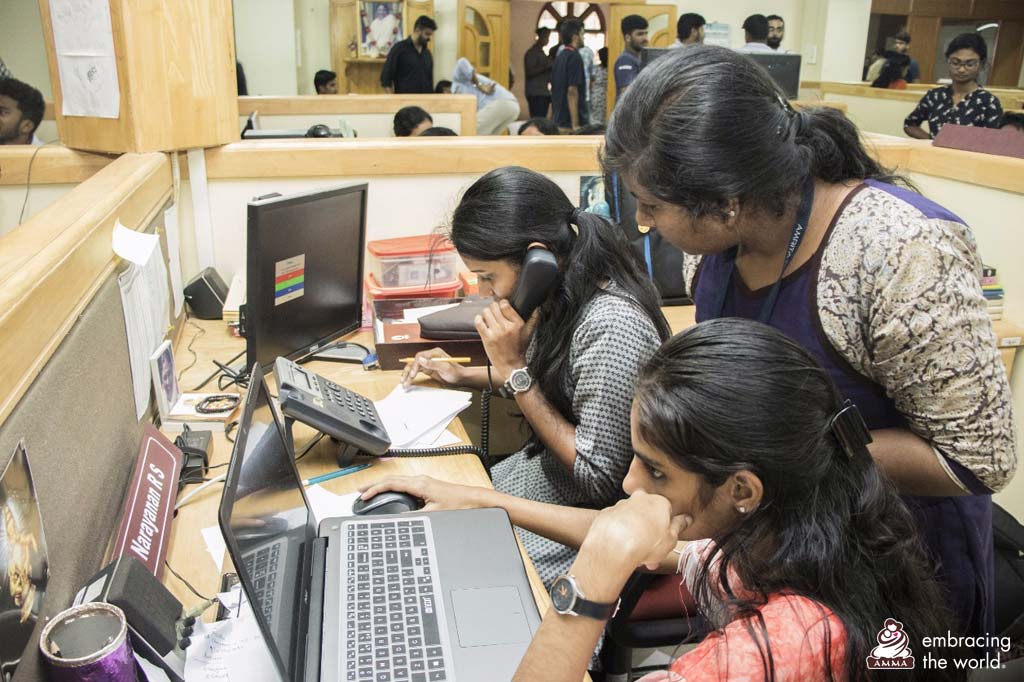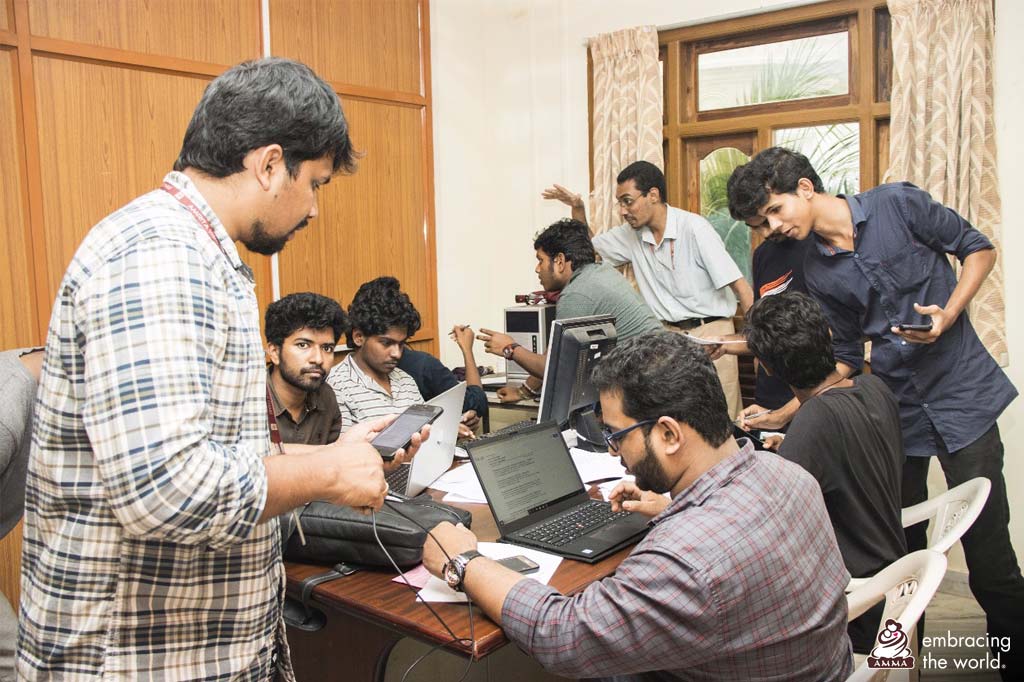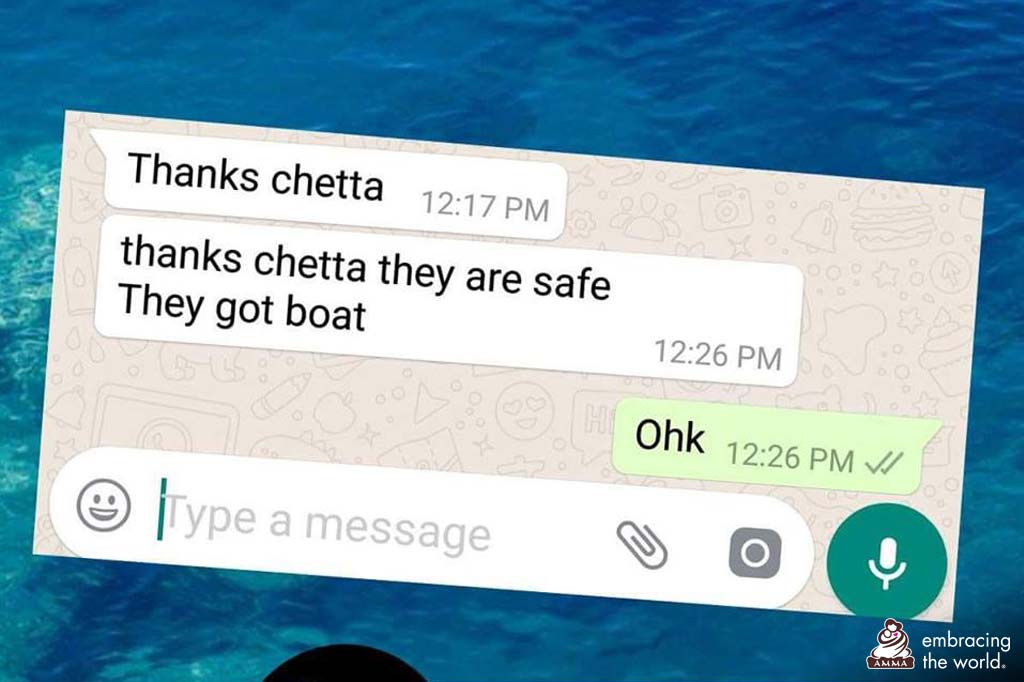August 27, 2018 - Kollam, Kerala, India
During the Kerala floods, students and faculty at Amrita Vishwa Vidyapeetham’s Amritapuri Campus were desperate to think of some way to help the hundreds of thousands of flood victims throughout the state.
They had already set up donation centers for clothing, food and other care supplies. They had also already made plans to start travelling to affected communities to begin cleanup when waters receded. But it didn’t feel like enough.
Then the idea came to them, “What if we could set up a call centre to help rescue the stranded?” And so at the university on August 16th at 1:00 p.m., enough people came together and enough technology was set up to begin Amrita Helpline̶--a 24-hour call-in rescue center.
Within five days, the team had fielded more than 25,000 calls and connected over 100,000 flood victims with the appropriate relief services. This included government officials, Navy, Air Force, National Disaster Response Force, Kerala State Police, local fishermen and other volunteering agencies.
For example, the helpline received a call from a woman who desperately explained that her elderly mother was clinging to her back, while she held a baby in her arms above the rising waters.
The call center volunteers reached out to a nearby fishing boat and within ten minutes, the woman, her mother and child were all saved. Learning of her rescue, the woman’s husband, in gratitude, sent truckloads of relief supplies back to Embracing the World to distribute to those still in need.
The helpline also received a call from a man asking for help as he was stranded in his home. They sent a fishing boat to the area, where the fishermen discovered an elderly couple inside a neighboring house, up to their neck in floodwaters. The couple was astonished to see the fishermen come to save them.
“We couldn’t call,” the couple explained. “We don’t own a mobile phone. As the waters rose, all we could do was pray for someone to rescue us.”
“I can speak for all of the volunteers when I say that we were ecstatic to be able to help in this small way,” said A.R. Amritesh. Amritesh is the coordinator for AYUDH Amritapuri. AYUDH is Embracing the World’s youth chapter and they played a central role in running the helpline.
“We got a lot of positive feedback from the Indian Air Force and Navy, telling us that the information collected through the Amrita Helpline helped them to better target their rescue and relief operations and to follow through with greater speed.”
The helpline team ultimately consisted of more than 400 students and faculty who broke their days up into three different shifts for five days straight. When a call came into the helpline, 20 phones in parallel servicing were continuously answered.
“I can say with confidence that we fielded every single call that came in,” said Amritesh. “Each of the student volunteers would ensure the caller’s information was passed on to the relevant rescue teams. They would then follow through until the stranded persons were secured to safety.”
Not only did the volunteers work the phone lines, they also fielded help requests via the internet and social media. They used special techniques to identify and verify information about locations, routes, relief agencies, volunteers and suppliers. They then conveyed this information to rescue teams to help them precisely target their operations.
This commitment made the services provided by Amrita Helpline invaluable and popular both among the public and rescue teams. The helpline also coordinated the distribution of food, clothes, medicines, and other essentials among the rescues. In addition, the volunteers were able to help give assurances to relatives of flood victims living abroad.
“There are Malayalees all over the world,” said Ramesh Azhakesan, AYUDH Core Committee Member. “The fact that we were able to field calls from the Gulf, Europe and the U.S. and help families learn the whereabouts and safety of their relatives gave thousands of people a lot of relief.”
The Amrita Helpline was a demonstration of how technology and teamwork can help during calamities through the positive use of social media. The motivation for Amrita Helpline came from the Compassionate Kerala group, an initiative by Prashanth Nair, a former collector with the Indian Administrative Service (IAS) in Calicut, Kerala.
Meanwhile, restoration and relief services for people affected by the floods continue to grow. More volunteer teams are assembling to visit locations and aid in medical treatment, essential supplies, environmental cleanup and assessment of how to rebuild damaged buildings and properties.
We are working hard to reach remote tribal communities in Kerala, as these are villages that are mostly isolated at the best of times.






